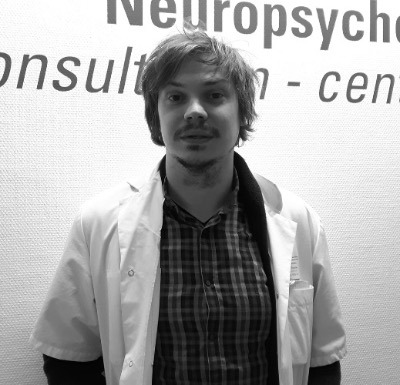Expert interview: discovering neuropsychology (1/3)
Published 6 Mar 2020 • Updated 10 Mar 2020 • By Andrea Barcia
Timothée Albasser is a neuropsychologist at Hautepierre Hospital in Strasbourg, France. He agreed to speak with us about his discipline and its impact on patients. Who is affected? What is a neuropsychological assessment? Read on to find out!

Hello Timothée Albasser, thank you for agreeing to answer our questions. Can you explain to us what neuropsychology is all about?
Neuropsychology is the study of cognitive, emotional and behavioural disturbances caused by brain injuries. This disciplinary field lies at the crossroads of neurology, psychiatry, psychology and neuroscience in general.
From neurology, neuropsychology makes constant reference to the brain injury or neurophysiological disorganization that is responsible for disorders (Cambier et al., 2000). It borrows concepts form psychology to describe behaviours. Psychiatry provides a reading of psychopathological disorders and the comorbidity factors sometimes associated with them. Neuroscience sheds light on mental activities, for example, through neuroimaging (magnetic resonance imaging (MRI), PET scan).
According to the current position of the Société de neuropsychologie de langue française (the French-Speaking Neuropsychological Society), neuropsychology deals with the relationships between the mental processes underlying brain activity, cognitive functions, and emotional behaviour, because brain damage affects both the patient's cognitive efficiency, emotional functioning and behaviour.
The expertise of clinical psychologists specializing in neuropsychology must be founded in knowledge of the neural bases of behaviour, cognitive theories, theories of the development of the human psyche, its organisation and its normal and pathological manifestations. It also requires training in listening to the patient and his or her family, in a comprehensive approach to the situation.
When do patients come to see you? Can they make an appointment directly?
We are called to see any type of patient reporting a memory or cognitive problem in general. The purpose of the neuropsychological assessment is then to objectify (or not) this problem and to bring to light the presence of possible cognitive disorders. So, any person who has a cognitive problem can talk about it with their GP, who will send a request directly to our service. Usually, the patient is called in within a month.
Also, as I work in a university hospital, I am in direct contact with the neurology, geriatrics, neurovascular and rheumatology departments. Thus, I regularly see patients hospitalized in these departments, in order to conduct cognitive assessments.
Why a neuropsychologist and not a neurologist straight away?
We work closely with neurologists. The neuropsychologist is often on the front line and is the one who sees the patient in the first stage, at the request of the treating physician. Thus, the neuropsychologist will collect the concerns of the patient and his or her family and friends, and will look for elements explaining how the disorder developed, how it evolves and its repercussions on the patient's daily life. The neuropsychological assessment will therefore serve to objectify (or not) the presence of cognitive disorders and will allow diagnostic hypotheses to be made. Following this assessment, the neuropsychologist will be able to propose a list complementary tests if necessary (MRI, blood biology, sleep tests, etc.), in order to determine the aetiology of the disorders.
It's only after all these tests that the patient sees a neurologist. During this consultation, a neurological assessment is also carried out. At the end, the neurologist will have all the information needed to make a diagnosis about the origin of the patient's cognitive problems. In the case of Alzheimer's disease, the test most likely to diagnose the disease is the study of biomarkers (levels of beta-amyloid and tau) in the cerebrospinal fluid (through a lumbar puncture).
What is a neuropsychological assessment exactly?
Neuropsychological assessment can take several forms. A "standard" neuropsychological assessment lasts an average of an hour and a half. Neuropsychological tests consist, for the most part, of "paper-and-pencil" type tasks. Some tasks are also carried out on a computer, particularly with regard to the evaluation of attention and focus. These tests are standardized - the testing period is the same for all patients, and the results are interpreted by comparing them with the norms obtained in patients matched in terms of age, sex and socio-cultural level.
How is the assessment conducted?
Each assessment begins with a preliminary clinical interview to establish a relationship of trust, during which the neuropsychologist:
- Explains the objectives and content of the assessment.
- Asks the patient what he or she expects from the assessment and tries to clear up any misunderstandings about its purpose and the psychologist's role.
- Inquires about school and/or work history, personal and family life events, everyday activities, medication and alcohol and drug use.
- Has the patient clarify the history of the disorder. Even if the information is available in the medical record or in school reports, it is still essential to take into account the patient's subjective point of view and the way in which he or she shows and describes his or her own difficulties.
- Assesses emotional state, looking for anxiety and depressive symptoms. The neuropsychologist also looks for factors that could affect mental performance during the examination. For example, a recent life event with a strong emotional impact such as job loss, bereavement, or more trivial things which may interfere with alertness, such as insomnia or fasting. In the latter case, subjects must eat before the assessment.
- Notes the handedness (being right-handed, left-handed or ambidextrous) and the socio-cultural level of the patient. The socio-cultural level allows the neuropsychologist to compare the results with the norm, depending on age and level of education. The standards for psychometric tests are included in each test manual. The comparison between the patient’s results and those of his or her age and education level allows the neuropsychologist to examine their significance. However, the use of these tests alone does not allow him or her to make a definitive diagnosis.
- Reiterates the ethical rules of test data confidentiality and respect of patient rights with which the neuropsychologist must comply. In addition, psychologists who have never completed an apprenticeship or received theoretical training in neuropsychology are not qualified to conduct a neuropsychological assessment. Additionally, in the case where the neuropsychologist operates in private practice, it is during this preliminary interview that the financial terms (cost of the assessment, coverage or non-coverage by the NHS) must be clearly defined with the patient.
- Before concluding the interview, the neuropsychologist should ask the patient if he or she has any other questions, for example, about the assessment or any other topic that he or she feels is important and has not been discussed. It should be noted that the specialist will not be able to indicate to them during the examination whether their answers to the various tests are right or wrong. Usually, the patient is given a summary report of the assessment results.
Why is it important to talk not only with patients but also with loved ones?
Apart from the patient, the person who suffers most is the so-called "primary carer". This is usually the patient's spouse, but it can also be children, other family members or even friends. Thus, we are present first and foremost to listen to the carer's concerns, to gather their feelings about their loved ones' cognitive problems and to alleviate their suffering.
The primary carer’s input allows us to gather crucial information and will give us an idea of how the patient functions at home, his or her self-sufficiency, what he or she is capable of doing and, finally, the observed difficulties. This perspective will complement the patient's own and will give us the keys to select the best neuropsychological tests to perform.
What happens after the neuropsychological assessment?
After the neuropsychological assessment, it is important to take the time to ask the patient how he or she feels about the tasks they've just completed: did he or she find them difficult? Challenging? Conversely, did he or she find them easy? This is also the time during which we present the results to the patient and, if the patient wishes, to his or her family and friends. If the neuropsychological assessment is normal, it will then have a reassuring effect on the patient. In this case, we usually do not offer a follow-up. If abnormalities are found, we generally offer a follow-up with a neurologist or a geriatrician from our department, who will then try to clarify the aetiology of the disorders, possibly also by carrying out additional tests.
Find Timothée Albasser again soon in the Health Magazine:
>> Alzheimer's disease in neuropsychology
>> Clinical research: what advances can be expected in neuropsychology?
--
Meet Timothée Albasser

Timothée Albasser is a neuropsychologist at the CMRR (Centre Mémoire de Ressources et de Recherche) of the Hautepierre Hospital in Strasbourg since April 2014. Holder of a Master II in clinical and cognitive neuropsychology obtained at the University of Strasbourg, he also holds an inter-university diploma in Normal Memory and Memory Pathologies obtained at the University of Medicine of Strasbourg.
He is active in clinical neuropsychology, in the context of memory consultation and research neuropsychology (Hospital Clinical Research Programme and therapeutic trials), as well as at the Saint-François Geriatric Day Hospital. At the same time, he also works as a clinical studies technician, mainly for cohort studies. He is part of the team at the CMRR in Strasbourg composed of Professor Blanc, Dr. Cretin, Dr. Martin-Hunyadi and Dr. Philippi. The CMRR team is active in research and in the publication of scientific articles, particularly in the field of Alzheimer's disease and Dementia with Lewy bodies.

 Facebook
Facebook Twitter
Twitter




